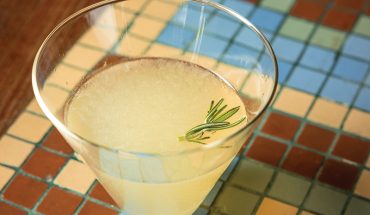
Drop the Hammer
by Laura White
photography by Jillian Clark
It’s 11 p.m. on a Saturday night in May when Kim Hammer finally has a few minutes to sit down for an interview. She’s had a busy start to the year, between a trip to Miami for the United States Bartenders’ Guild, fundraising for the annual Bee Ball, closing on a new condo, and celebrating Bittersweet’s fourth anniversary alongside the eighth for her and her partner in both life and business, Lewis Norton.
Sitting down for an interview is actually an overstatement. Really, she’s behind the bar of Bittersweet, her dessert, cocktail, and coffee lounge downtown. It’s packed, tables full of people enjoying chocolate bourbon pecan pies drizzled with salted caramel sauce, lemon-lavender crème brulee, ice cream cookies, sherbet, and cupcakes alongside flutes of champagne and stiff highballs. Hammer hustles back and forth between orders. She’s been at it since 6 a.m.; her daughter had a Science Olympiad bright and early. But she shows no sign of slowing down, or of minding at all.
Hammer remembers, for instance, this frequent customer’s love of strawberries. She catches my eye, beckons me closer with one hand, and smiles slyly. “You like strawberries, right? I saved something for you. We sold out an hour ago. Don’t let people see this.” She grins, and ducks down behind the counter.
She places a thick slice of roasted strawberry cream pie with a chocolate pretzel crust on the bar top in front of me. It’s the aptly named Hella Good Strawberry Cream Pie, a recipe born of a rough season for strawberries a few years back, she says—to make her favorite fruit taste a little like it’s supposed to, during a season bearing watery berries, she roasted strawberries to get the flavor out.
This year, as it happens, is the best year for strawberries since Bittersweet first opened—when Hammer served a simple bowl of sliced strawberries and house-whipped cream—so the pie is particularly on point, and the seasonal menu items, food and drinks alike, comprise a sweet ode to the tart little fruit. She’s been putting the strawberries in everything, obnoxiously, as she says. But Hammer’s obsession with the fruit is no secret. All you have to do is look at her left arm, where her love for them is immortalized in ink. “Strawberries are the best and the quickest way to teach a person how much better things can be if they’re eaten seasonally and locally,” she says. “I feel like there are a lot of people who have never had a perfect strawberry.”
Giving back
Hammer’s penchant for strawberries harks back to more than 12 years ago, during her first year at the Carrboro Farmers’ Market with her then-in-home bakery, bittycakes. She was placed in a stall next to another first-timer, a farmer named George who was, she says, “starving to death, because you don’t make any money (as a farmer), especially in the very beginning.” Hammer swears his strawberries, though, were the most amazing she’d had in her whole life, and she wanted to support him in whatever way she could. She would feed him her wares each week: cupcakes, pumpkin bread. “It’s really not the most nutritious stuff, but I was like, ‘This is what I have. Here: eat, eat.’”
That passion for seasonal, locally sourced food and the impact it can make on the way we engage with—and provide for—one another is what drove Hammer to launch Raleigh Provisions in 2017, a specialty store carrying gourmet food and gifts from North Carolina artisans. It’s also why she was so excited to be tapped for the Bee Ball Royalty Court this year, she says. The court competes to raise the most funds for the Beehive Collective, a Raleigh giving circle. Each year the group chooses a theme, and this year’s is food insecurity. The cause resonates with Hammer. “I think about it all the time. One of the most amazing perks (of being in the food industry) is that we usually get to eat very well.”
But not all are cared for in the same way, or have access to the same resources, and having been a single mother of two—a daughter, 10, and a son, 15—Hammer understands how difficult it can be at times. “A lot of other people in my financial situation and in blue-collar professions, they don’t have that perk, they don’t get to eat like that.”
So Hammer used her business platform to raise as much as she could: in May, Bittersweet hosted a Cinco De Mayo and Kentucky Derby party, in addition to a business birthday party, and all sales went to Beehive Collective. Leading up to the Bee Ball, Hammer also encouraged her guests to give up at least one visit to Bittersweet and put that tab toward the theme, food insecurity, instead. All said and done, at last month’s Bee Ball, Hammer was crowned Queen of the court and the event, including Hammer’s fundraising efforts, raised $45,000 in total to fight food insecurity through local organizations.
The food industry helped Hammer through her own tough times. Bittycakes, and North Carolina laws that allow home-based food businesses, were what allowed her to make ends meet, because she was able to operate her bakery at home and wasn’t paying overhead for a commercial kitchen. “That business literally saw me through two children, a back surgery, and a divorce … Any number of those things could have put me out of business if I was paying for a storefront.”
Hammer had always enjoyed baking, but she dove in deep to keep busy after her first son was born: experimenting with new techniques, making cakes and cookies for his friends (and their parents). It was one of those mothers who, in 2004, suggested she should be getting paid for it. Hammer’s first response was skeptical. “I was like, yeah, that’s probably really complicated and hard.” But the would-be customer persisted, and Hammer is now grateful: “Big ups to moms and girlfriends—she literally put the phone number for the small business association in my hand and was like, just call them. Just tell them what you do and see what they say. And I did.” Within three days, she had a business.
Flash forward to 2018, and “complicated” is what drives her business model, she says, along with creating places she wants to patron. “Because it’s what I like!” has become a kind of mantra for her process. And Hammer knows what she likes. “I feel blessed that it turns out a lot of other people like it too.”

Paying it forward
It isn’t all driven by desire, strictly speaking. Hammer follows the business method of Danny Meyer, the New York City restaurateur and CEO of Union Square Hospitality Group who is well-known for his restaurants and his writings, including 2006 book Setting the Table, which focuses on the power of hospitality in service, business, and life. If somebody comes to her with a building, she looks around and says, “What does this neighborhood need? What does it not have?” And she’s committed to bringing others up with her.
This is what led her to help launch the Raleigh/Durham chapter of the United States Bartenders’ Guild, for which she serves as vice president, along with President Matthew Bettinger, a longtime friend and professional confidant, co-owner of SideBar in Cary, and manager of C. Grace and The Empress Room; and Tony Ursone, a former Bittersweet bartender and now retail hospitality account manager for Southern Glazer’s Wine and Spirits, among others.
The USBG is a professional association for bartenders and bar owners with a mission to unite the hospitality community to advance professional bartending. The Raleigh/Durham chapter hosts a number of events with that goal, from educational spirit lectures and tastings to financial wellness workshops. Hammer believes in what she does, and in those she does it alongside of in a city she’s proud to call home. “I’m kind of a rare breed around here now because I’m from here; and the truth is, when you’re behind the bar and you’re proud of where you’re from and you’re proud of all the things produced there, you can’t help but talk about it.”
That’s how Raleigh Provisions was born. Guests at Bittersweet always wanted to know where they could find the milk she used, or the coffee, or the jam. So she decided to bring the best of the farmers’ market to downtown Raleigh. “I can get really emotional about this. (The artisans’ dedication) is on such an amazing level,” she says. “Yes we want to make money and we need to make money, but it’s such a secondary thing because I just wanted people to know about all this.” Every Saturday, local vendors come out to demo their goods in the shop. This is important to Hammer because she wants people to have the opportunity—on a consistent, not special-occasion basis—to meet their makers. “I don’t know if there’s anything more intimate … you’re literally taking something somebody made and you’re putting it in your body. ”
This speaks, again, to her intentions: the reason she launches businesses is because she believes in them. She may be opening places that she wants, but only because she wants to share them with others. “I get really excited about those things, and it feels really good, so why wouldn’t I want everyone else to feel that?”
She still thinks back to some words of wisdom from George the strawberry farmer in those early days in Carrboro. “I asked him one time if he would tell other people to be a farmer. I (said), are you glad you made this choice?”
His response: “It’s really, really honest and good work and I sleep really well at night. You can’t put a price on that.”





